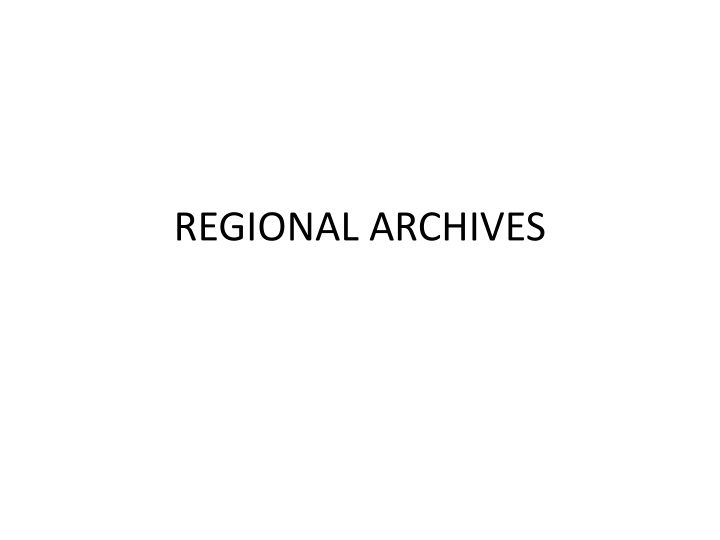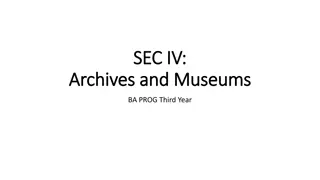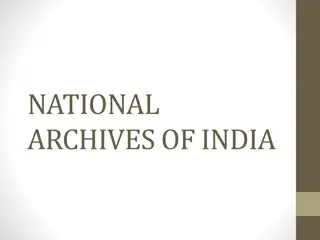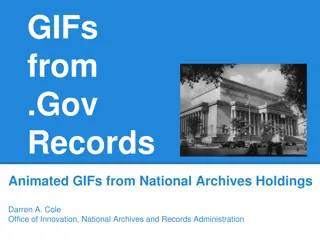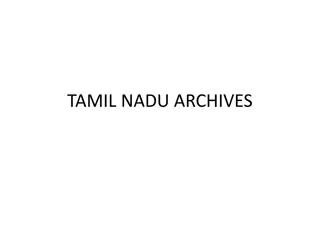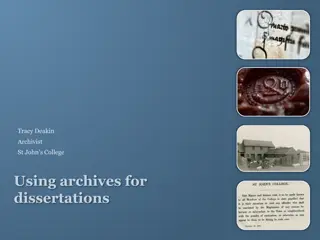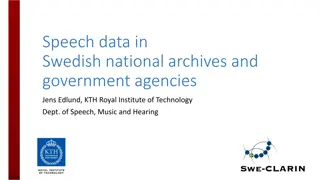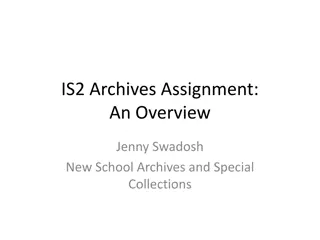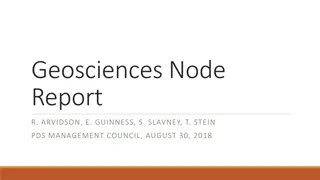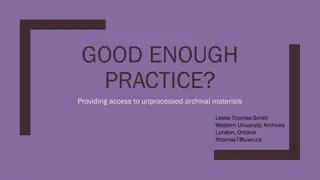History of Regional Archives in India
The National Archives of India established regional offices in important cities like Bhopal, Panaji, Jaipur, and Puducherry to preserve historical records. These regional centers house a variety of collections, including pre-Mutiny and Mutiny Papers, Portuguese Military Records, and French administration records. The role of archives in society is crucial for studying and understanding governmental and societal activities through historical evidence and records. Additionally, private custodians hold archival wealth in categories such as business houses, religious institutions, political parties, and educational institutions.
Download Presentation

Please find below an Image/Link to download the presentation.
The content on the website is provided AS IS for your information and personal use only. It may not be sold, licensed, or shared on other websites without obtaining consent from the author.If you encounter any issues during the download, it is possible that the publisher has removed the file from their server.
You are allowed to download the files provided on this website for personal or commercial use, subject to the condition that they are used lawfully. All files are the property of their respective owners.
The content on the website is provided AS IS for your information and personal use only. It may not be sold, licensed, or shared on other websites without obtaining consent from the author.
E N D
Presentation Transcript
Bhopal The National Archives established regional offices in important cities . The first regional centre was started in Bhopal on 23rd November , 1954 . This office cause into existence as a result of an offer from to former Princely State of Bhopal to hand over all its records to the government of India as a gift . This offer was accepted and a Keeper of records with other necessary Staff was sent to Bhopal to take charge of the records . This major collections contain Pre- Mutiny and Mutiny Papers , Origional authenticated copies of laws written on Parchment , The rules of Bhopal bearing seals , bundles to Persian records and books in different languages
Panaji The second regional centre was started in 1965 at Panaji in Goa . The major collections of Archives were Portuguese Military Records , including Military court , Judicial court of Savestee ; Village Cummunity books of Ponda , Books of Perneum , Travel registers and so on . It also did all routine work of archival keeping . The research scholars were also permitted to consult them .
Jaipur The third regional centre of National Archives was started at Jaipur , in Rajasthan on 3rd January 1977 for housing the non current records of the central government . Puthucherry In 1979, the National Archives of India started the fourth regional centre at Pondicherry . It accommodated the records pertaining to French administration in Pondicherry .
Archives and Society The activities of the Government and the people could be studied and assessed , It has been left in the form of Archaeological evidences and records . Fortunately , man has got an in born desire to perpetuate his memories of the past . He wants to have some link with the happenings and events of his past life and hence preserves things . Records of important personalities are maintained and preserved by the Government . However , some records are privately owned and maintained
The archival wealth in private custody falls into six major categories . 1. Archives of Budiness and Industrial houses like T. V. S. , Ramco , Parry Company , Lakshmi Group , Sakthi Group PSG Groups etc . 2. Archives of religious and communal institutions like London Missionary Society , CMS, R.C.Church , Nadar Mahajana Sangam , Brahmins Association , Devar Peravai etc . 3. Archives of Political Parties and trade Unions like The Sathyamoorthy Bhavan is managed by the Congress Party . Arivalayam is managed by DMK Party P. R. Bhavanam is managed by CPI ( M) and all India trade Union Congress , Indian National Trade Union Congress etc .
4. Archives of Educational Institutions like Madurai Kamaraj University , Annamalai University , Madras University etc 5. Archives of former Princely classes and Aristocrats like the Maharajas of Trivancore and Nawab of Bengal . 6. Archives of eminent personalities and Families . Besides the above mentioned Six categories considerable amount of Archival Material relating to India are found in Private Archives in other countries .
